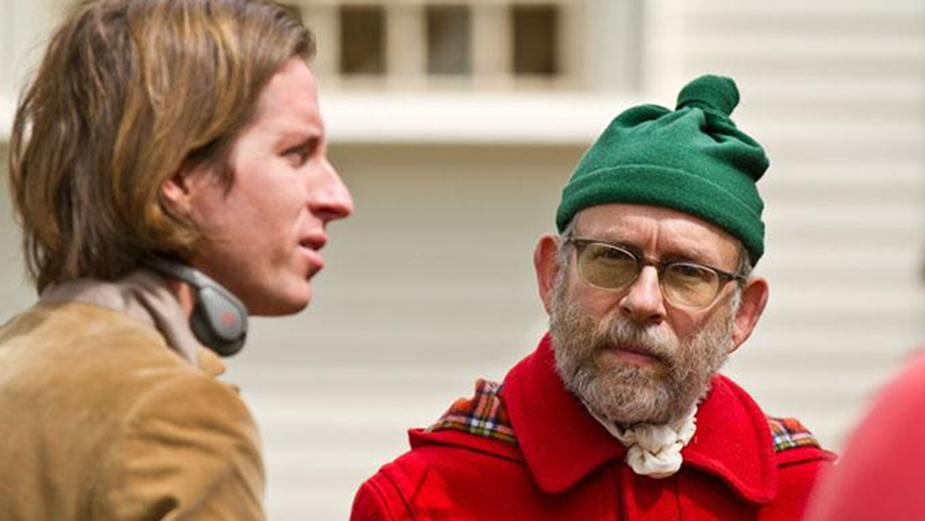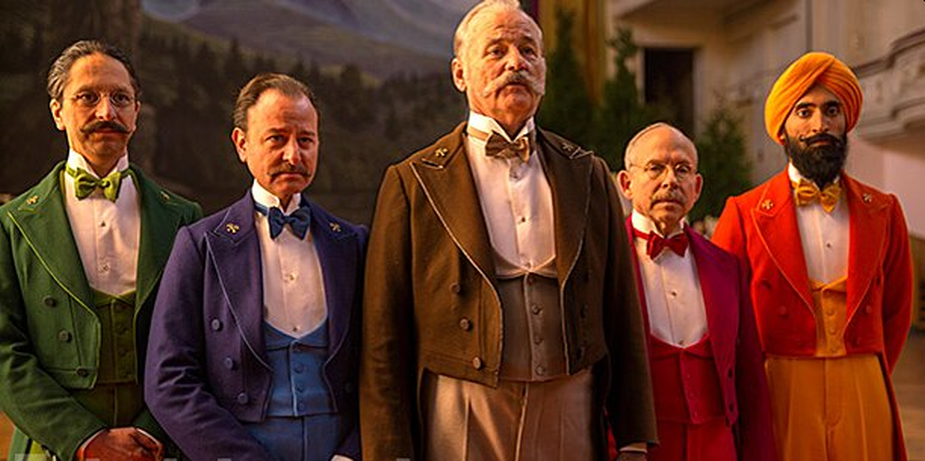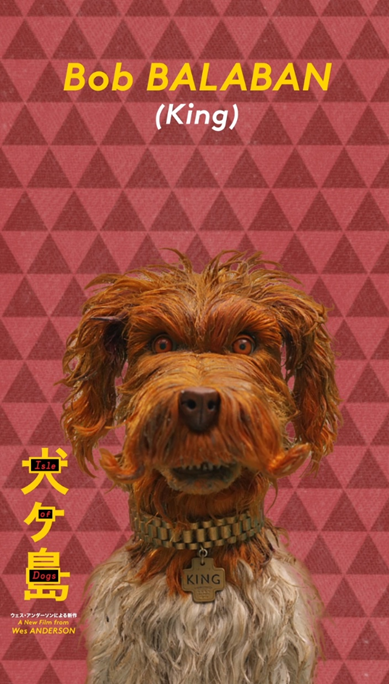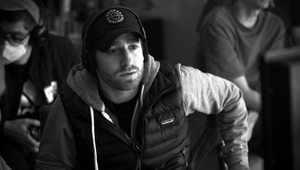
My Creative Hero: Wes Anderson

Bob Balaban created, produced, and starred in the Academy Award-winning movie Gosford Park, and produced and directed the HBO movie Bernard and Doris, starring Susan Sarandon and Ralph Fiennes, which was nominated for 10 Emmys, three Golden Globes, and two SAG awards. He also produced and directed the award-winning hit Off-Broadway play, The Exonerated. Bob has directed more than 30 television episodes, as well as four pilots and a number of television commercials. As an actor, he has appeared in nearly a hundred movies, most recently, The Monuments Men, starring George Clooney, and Wes Anderson’s The Grand Budapest Hotel.
LBB> Who would you say is your creative hero?
Bob> Wes Anderson. He seems to be a lot of people’s creative hero, so forgive me for not being original. It’s not my fault. You don’t choose your creative hero. They just ARE your creative hero.
LBB> How long has Wes Anderson been important to you and what are your first memories of meeting him or coming across his work?
Bob> Anderson’s work has been an inspiration since I saw his first movie, Bottle Rocket, 25 years ago. I was immediately struck by the film’s off-beat pacing and crisp, good-natured spontaneity. It reminded me of Ernst Lubitsch’s early work: seemingly effortless and meticulous. I needed to know more about this 20-something visionary. Google wasn’t invented yet, so I quickly read up on whatever I could find out about him. I became a diehard fan of whatever Wes was doing.
LBB> How did you get to know him and how has your relationship evolved over the years?
Bob> Fifteen years and four Wes Anderson movies later, Wes casts me as the narrator in his sixth movie, Moonrise Kingdom. His signature symmetry has become more prominent. His storytelling is richer and more complex. And his prep is still enormously detailed. I know this because A) I’ve seen all his movies and B) Google has been invented and it’s filled with information about all things Wes.
Soon I find myself in Wes’s production office for a wardrobe fitting for my one and only costume. My first encounter with the man is uneventful but telling. He’s friendly. He’s focused. And he doesn’t talk very much. He’s too busy paying rapt attention to every last detail of every article of clothing I try on. An hour later, he signs off on the outfit and I catch a glimpse of myself in the mirror wearing my scratchy green wool-knitted cap, my bright red winter coat, and my raggedy beige scarf. I haven’t just been given a costume. I’ve been given my character.
The next day, he shows me five or six “test” videos he’s made in which he plays the narrator in different parts of the frame. Sometimes, he’s at the bottom. Sometimes, he’s in the middle or off to one side. How could anyone possibly know which positions in a frame are funny and which aren’t? Wes does. His instincts are uncanny.
And then, Wes and a few crew members and I sit down to dinner together. Over the course of the next 10 years, I’ll be in the next four of Wes’s movies, and I’ll come to learn that eating dinner together with the gang is the first step towards becoming a member of his film family. Everyone’s invited and you don’t have to come if you don’t want to. But why wouldn’t you want to get to know your fellow actors and crew members better? Not to mention your director.
Wes is inclusive by nature. He shares ideas with you; shows you his storyboards; encourages you to watch the animatics he started making during the shooting of The Grand Budapest Hotel. On weekends, he’ll screen his favorite old movies for anyone who wants to see them. Wes likes to be surrounded by familiar faces when he works. When he was a kid, he made silent home movies starring his friends and his family. He’s still making home movies with his friends and his family – only the movies are bigger. And they have sound. In many ways, he remains remarkably unchanged.
Watching Wes shoot that summer in Rhode Island is a crash course in understanding both him and his work.
One night, we do a particularly complicated sequence. Everyone gets on their marks and we rehearse. I stand at the edge of a lake perched on a boulder, release a brightly lit weather balloon, teeter my way to shore along a narrow plank, take out a wind-measuring device and crank it, all the while describing the massive storm that’s about to hit. Meanwhile, a canoe in the background filled with eager young Khaki Scouts pulls up and the kids hop out of the canoe and slosh their way onto shore. Wes carefully leads us through our paces as the camera crew finishes lining up the shot and prepares to roll.
The scene will be shot in one long take using only natural light. We’ll begin at the first sign of sunset and won’t stop until we have to. Since it’s impossible to predict what the contrast between the ever-darkening sky and my brightly lit weather balloon will look like, Wes will keep shooting the two-minute scene until it’s pitch black. He’ll select his best take the next morning when he looks at the dailies.
We begin. The kids can’t paddle fast enough, so grips attach ropes to the canoe and drag it onto the shore. The timing of the release of the weather balloon must be coordinated with the arrival of the canoe. We take a few practice runs. It’s getting darker. Wes remains cool. And calm. He knows exactly what he’s doing. And he’s worked with his crew for so long they can practically read each other’s minds. Wes’s confidence is contagious. Soon, the scouts wield their oars as if they’d been paddling them for years. And I never even come close to falling off my plank. No one rushes. No one yells. Everything’s working like a well-oiled machine and Wes proceeds to shoot 30 or 40 seamless takes until it’s too dark to continue. And then he’s gone. He got what he wanted in the time he allotted. Sometimes, slower is faster.
LBB> Why is he such an inspiration to you?
Bob> Wes is such an inspiration to me because:
● After making movies for 25+ years, he still loves what he does.
● He never makes the same movie twice.
● He knows what he wants.
● He treats his cast and crew with respect.
● He’s a wonderful communicator.
● I love his imagination.
● The beautifully artificial worlds he creates contain characters with very real beating hearts.
● He’s never late for anything.
● He knows what’s important.
● He’s a loyal friend.
● He reads voraciously and has an encyclopedic knowledge of film.
● He’s a stickler for perfection who knows how to stay on a schedule.
LBB> How does Wes influence your work?
Bob> His preparation is a wonder and I do my best to emulate it. I’m not there yet. But I’m trying.
 Photo from The Grand Budapest Hotel. Photo Credit: Entertainment Weekly
Photo from The Grand Budapest Hotel. Photo Credit: Entertainment Weekly
LBB> What piece or pieces of Wes' work do you keep coming back to and why?
Bob> I keep coming back to Bottle Rocket because it contains all the seeds of everything he was about to become. Only unlike many young directors who do promising early work and are never able to realize that promise, Wes more than realized his. He expanded it. As he matured, his work matured but he never lost his earnest nature, his humour, or his humanity.

The character of King, voiced by Bob Balaban, in Isle of Dogs













